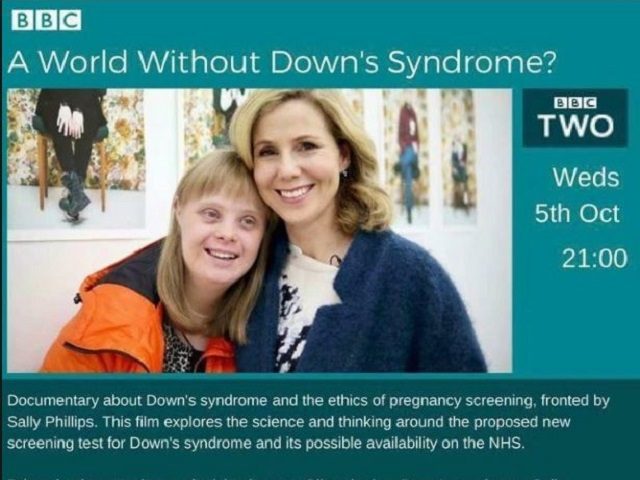Adopting a surprisingly pro-life tone, a BBC documentary questions the rationale behind a controversial new UK pregnancy screening program that indicates the presence of Down syndrome in unborn babies.
Titled “A World Without Down Syndrome?”, the documentary is hosted by English actress Sally Philips, whose 11-year-old son, Olly, is a Down child.
“In the last ten years, the number of people terminating for Down syndrome has gone up by 40 percent,” Phillips notes. “Now nine out of ten British women terminate when they receive a positive diagnosis.”
The result is that only 40,000 people with Down syndrome are left in the UK.
The situation could still get worse. In countries where the new diagnosis has been applied across the board, the number of Down syndrome babies aborted has gone up significantly. In Iceland, for instance, 100 percent of pregnant moms with a diagnosis of Down syndrome in the last five years have aborted, and no child with Down syndrome has been born.
Phillips finds it especially troubling that doctors and other medical professionals routinely paint a grim picture of life with a Down child, leading many parents to choose to abort their children.
In the documentary, one fetal medicine expert tells Phillips: “I have learned over the years, that for some people, having a baby with Down’s is an intolerable event.”
“They live for many years, so if we think of it as a burden to society, it is a burden that is going to last for a long time,” to which Phillips replies that she would never have thought of her son Olly as “a burden that is going to last for a long time.”
“What’s so very dreadful to the world about Down syndrome?” Phillips asks, noting how her own life was improved by the birth of her son, despite what doctors had told her.
“I expected tragedy and got comedy,” Phillips quips, noting that “a majority of people with a Down syndrome family member are really happy with their lot.”
According to the actress, the question comes down to: “What sort of world do we want to live in and who do we want in it?”
“If we’re heading for a world where we choose more who gets born, we need to think about what it is that we value,” she said.
This isn’t the first time Sally Phillips has waded into the debate on Down syndrome and abortion.
During a radio interview last May, Phillips noted the similarities between this sort of selective abortions and eugenics.
“If you think of people with Down’s syndrome as being a particular race. Then it’s utterly unacceptable isn’t it?” she asks.
Phillips said that it is important to extend the debate, bringing in the witness of people with first-hand experience.
“People with Down’s Syndrome have never been included in the debate,” Phillips said. “They’ve never been asked, because of course it’s preposterous to ask a person with Down’s Syndrome—who tend to really enjoy their lives—whether or not they ought to have a life.”
An article appearing in the Washington Post last year made a similar point, wondering aloud how certain selective abortions are still legal.
“But while governments (rightly) ban gender selection, selective abortion continues to be encouraged for children with Down syndrome,” the article stated. “In the United States and abroad, screenings are a routine part of health-care programs, and the result is the near-elimination of these children.”
The controversial BBC documentary has received mixed reviews.
The Guardian, for instance, objected to the choice of Phillips as a spokesperson, claiming that the actress lacks impartiality.
“When a subject is so close to the presenter’s heart that it is indivisible from it, the result is impassioned but not impartial,” the review stated.
One can only suppose that in the reviewer’s mind, in making a documentary about apartheid or child abuse, actors and directors should also maintain absolute impartiality.
Follow Thomas D. Williams on Twitter Follow @tdwilliamsrome

COMMENTS
Please let us know if you're having issues with commenting.